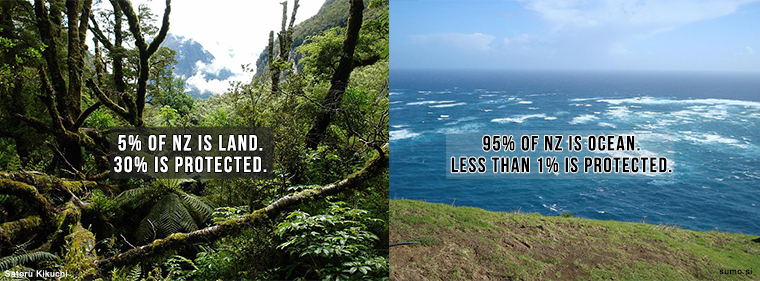Most of our country is under water. 95% in fact.
Given we have so much ocean, there is bound to be plenty of resource out there – including fish, energy, oil, ironsands and minerals (like phosphate on the Chatham Rise). There are massive economic opportunities, and our Government knows it, which is why they have been so gung-ho in pursuing them. The irony is that their lack of consideration for the environment is turning their quest for riches into an own goal. We have seen this with the recent decision to reject the mining of ironsands off the coast of Taranaki.
Despite what the Government thinks, protecting the environment would actually be good for business. There are plenty of economic reasons to protect our most important ocean ecosystems.
For starters New Zealand has a paltry amount of our ocean locked up in proper marine reserves – less than 1%. This compares to roughly a third of our land. Do we think that level of protection is bad for business? A decent level of marine protection would give the public the certainty that our environment is being looked after. This would make the Government’s attempts to use more of our ocean resources more palletable.
As on land, marine protection underpins economic exploitation. The fact is that any human endeavour can have uncertain side effects. Things can go wrong, as we saw in the Gulf of Mexico. Protected areas are an insurance policy against the ocean ecosystem falling over. As we have seen on the Great Barrier Reef the parts that are protected in marine reserves are more resistant to damage, such as from climate change or pollution.
Another reason protection is important is our overseas image. Like it or not, we are known for our 100% Pure brand and overseas consumers will increasingly hold us to account. Polishing off Maui’s dolphin would not be a good look for any country, let alone one with our reputation.
Consumers are also demanding their fish is sustainably sourced – and marine protection is a part of that equation. New Zealand is falling behind in this respect, and all the while we return to the crutch that our QMS is ‘world leading’. The QMS was world leading twenty-five years ago, but not now. The Aussies and many US states now manage their oceans better than us; we are no longer the golden boy of the ocean club.
Finally, the fact is that protection and planning how to use our oceans (zoning, as we do on land) provides certainty for investors. There are more and more industries using the ocean – fishing, aquaculture, mining and energy as well as Joe average recreational users. We need to think and plan ahead for how we manage conflicts that can arise between users. We are seeing these conflicts play out right now on the Chatham Rise. There is a proposal to mine rock phosphate in an area that is important for fishing. It also ironically includes an area where bottom trawling is banned to protect the seafloor – making a mockery of our Benthic Protected Areas.
Spatial planning would provide such certainty for all users, which is good for investment and good for business. It is simple property rights – the National Government should understand that. We are seeing this approach trialled in the Hauraki Gulf – but it remains to be seen how the process will work and what the Government will do with the outcome.
Now is the time to act on marine protection in our EEZ. Then we can think about exploiting the resources we have out there. The irony is that we led the world by designing a marine protection proposal for the Ross Sea, yet we haven’t even done it in our own ocean.

